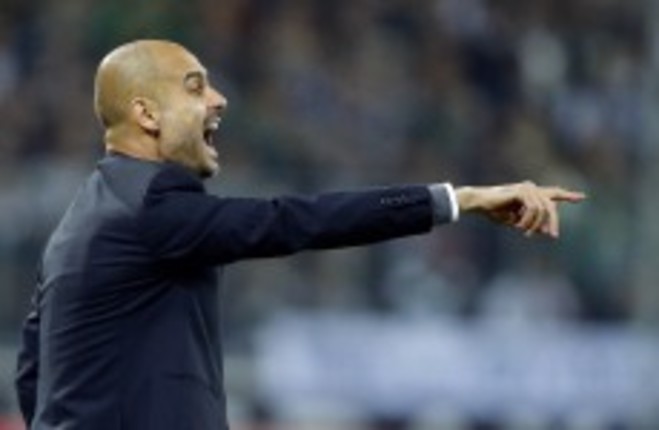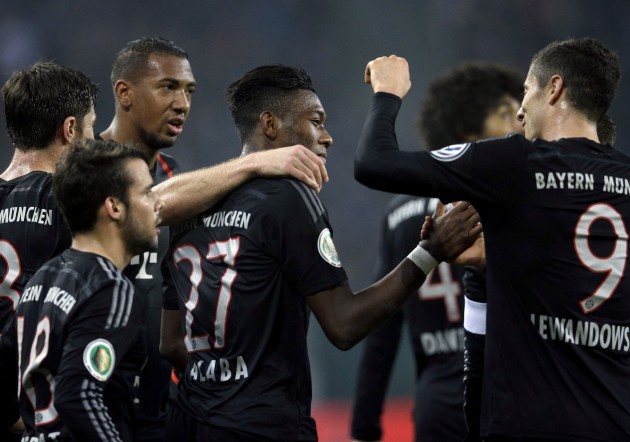BAYERN MUNICH HIRED Pep Guardiola to give their club a brand of football.
The Bavarians had, of course, been highly successful all throughout their history. However, their major wins had all been achieved using the preferred style of football of the coach at the time. There was no philosophy embedded in Bayern players from top to bottom as seen in many of Barcelona’s great sides.
Johan Cruyff gave Barca their modern template and they have been playing football based on his teachings for more than 20 years. That is why Guardiola, a Catalan through and through, was the man brought in by Bayern.
He was not, however, there to make a Barca-lite. The chief concern for some Bayern observers was that Guardiola would simply use the same tactics he had used at Barca B and with the first team. He had, after all, not coached beyond Camp Nou and had expressed the Barca way faithfully throughout his time at the club.
“My Bayern are different to my Barcelona,” Pep told Uefa. “But both are great teams with two great properties — they let me do what I believe in and put my thoughts into action.”
He is no ideologue. Last season showed that, yes, Bayern would seek to have even more of the ball than they did under Jupp Heynckes. Don’t forget though that, under Heynckes, Bayern routinely had all their outfield players in the opposition half looking for space and maintaining possession.
Pep did ask his players to work a little differently than they had been used to. Occasionally, it didn’t work out and Bayern looked stagnant. There was sterile dominance when they had the ball but did not do very much with it. Sometimes they had to go back to what they liked best and play with a 4-2-3-1 like the season before. When it worked, however, it was glorious. Bayern gave Europe 80 minutes of their best in the Champions League defeat of Manchester City at the Etihad Stadium in October. That was when all the pieces clicked together for Pep and for his players.
By the time Bayern lost to Real Madrid in the Champions League semi-final though there were some calls for Guardiola to leave his job. He had tried to alter the European champions beyond all recognition and failed at the highest hurdle. There was widespread criticism that Guardiola the fundamentalist had failed to cater to his players’ best attributes and a 4-0 defeat at home was the result.
The reality is somewhat different. Guardiola admits that the Real Madrid game was the worst night of his coaching career. However, that is not because his players failed to play Guardiola football. Worse, it was because he abandoned his principles. He tried to overload the attack and ceded space to Real, who need no second invitation to counter attack. That defeat only served to strengthen Guardiola’s determination to always play in a manner true to his convictions.
(Bayern’s head coach Pep Guardiola shouts during the German first division Bundesliga soccer match between Borussia Moenchengladbach and Bayern Munich)
“Our way of playing is excellent for the [opposition] as we defend 40 metres in front of Manuel Neuer,” Pep says. “But I won’t change my tactics. I have always played my teams very far forward ever since my first day at Barcelona B.”
He promised there would be further development this season. It’s a rare thing indeed for Pep, not only to line up with the same XI from game to game, but with the same strategy. Every match is planned out meticulously. Bayern will play according to the strengths of the opposition and deal best with their attacking threats. Combine this specific instruction with the lion’s share of the ball in meaningful possession, away from Bayern’s goal, and you have Guardiola’s plan.
In his book, Pep Confidential, author Marti Perarnau, who spent the entirety of Guardiola’s first season at Bayern by his side, described the five elements that the coach values most as a result of his time in the Bundesliga. Working out how to counter counter-attacks, how to defend and attack aerially, aggressive pressing high up the pitch, the use of two midfielders instead of his preferred one and the exploitation of space on the flanks. It is no longer enough to say that Bayern play with a 4-3-3 or a 4-5-1 or a 4-2-3-1.
The formation? It doesn’t matter. Bayern have lined up with two, three and four defenders. They have lined up with similar variations in midfield and up front. They even appeared to play in a WM formation, which was adapted by Gusztav Sebes during the 1950s with his glorious Hungary team. Pep has delved into the archives on more than one occasion looking for solutions. The Magic Magyars’ deployment of Nandor Hidegkuti in a forerunner of the “false 9″ coloured his thinking in using Lionel Messi there for Barcelona. Guardiola teams do not play in conventional positions but, instead, seek to best occupy the space on the field.
It’s about meeting the opposition in possession high up the pitch and winning the ball back quickly. When Bayern have the ball, it’s about stringing enough passes together to disrupt the organisation in the opposition ranks and find space for the attackers. The game against Roma, combined with beating Werder Bremen 6-0, probably represented the best week of football Bayern have played this season – not only in terms of the result but in how the games were executed.
“We played well,” Guardiola said after the Bremen victory. “Good build-up play, great positioning and the right attitude.” And that just about summarises what Guardiola seeks.
He has moved his team shape beyond categorisation. The team-sheets for Bayern’s 7-1 destruction of Roma suggested for example that David Alaba would play right back. He in fact played in the second line of what looked like a 2-3-3-2 with Jerome Boateng and Medhi Benatia the only true defenders in the team. It was exquisite, jaw-dropping football.
“The coach and the coaching team set us up really well for our opponents,” captain Philipp Lahm told the press after the Roma game. “We knew what we were up against, how to defend against them and performances like tonight’s are the result of that.”
There will be a new way to play against Dortmund though. Not much should be read into the 2-0 defeat suffered by Bayern to Dortmund in this year’s German Super Cup. Bayern were without some of their most important players and fielded close to a shadow team.
Without Franck Ribery and Arjen Robben, their chief attackers, Bayern were unable to increase the pace of their play after holding possession. It became what Pep hates – passing for passing’s sake. With those two back, expect Bayern to find plenty of opportunity on the flanks to attack Dortmund’s full backs as Juan Bernat, Alaba and Rafinha join up with the play further forward.
Guardiola won praise for the manner in which he orchestrated Bayern’ 3-0 win over Jurgen Klopp’s team at Signal Iduna Park last season. He mixed up the play, using long balls occasionally to counter Dortmund’s intense midfield pressing, before unleashing Thiago Alcantara and Mario Gotze to decide the game in the second half. He will no doubt have a new plan today but don’t expect it to look like last season’s.
Pep is not wedded to any one tactic. He is wedded to winning.
- By Peter Staunton, Goal.com

